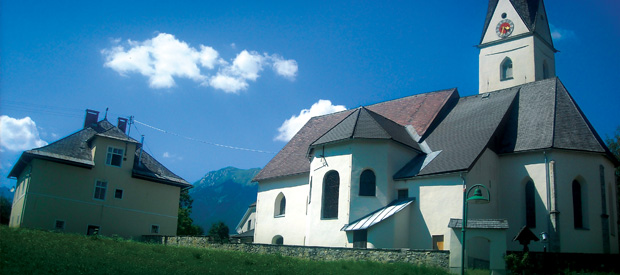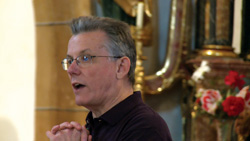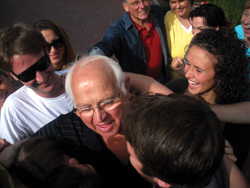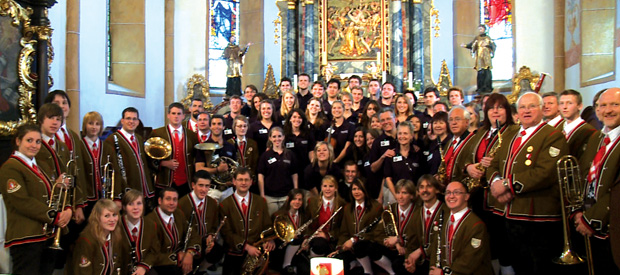The Mozart Files
Henry Price and Heidelberg summer music students retrace history in Austria.
“Picture this…”

Henry Price, director of the Heidelberg Summer Music Program and Seaver College professor of music, told the 34 students in this year’s program. “Late November 1779, the traveling theatrical company of Emanuel Schikaneder—who would create The Magic Flute with Mozart a dozen years later—was in dire need of shelter.

Henry Price
“The company was 45-strong,” he continued, offering one of the many stories uncovered in his research of Wolfgang Amadeus Mozart—the composer’s life, times, and friends—which Price has been conducting since he was a doctoral candidate in the ’90s.
“It was cold and snowy and there was no inn to be found. They came upon a small church, where one of the actors was able to communicate with the Slovenian-speaking people, and the entire company was not only invited in, but offered a place to stay and a sumptuous meal. The company members ate, drank, and expressed their gratitude for this tremendous show of hospitality with a beautiful impromptu concert. The priest at the church remarked that he had never heard such beautiful singing in his parish. The next day, the company bid a fond farewell to their hospitable hosts and continued their journey, which would eventually take them to Salzburg, where Schikaneder met Mozart and together, they created The Magic Flute.”
Connecting deeply with this story of history and hospitality, Price presented the research to students and then informed them that they would be traveling along the exact same path, finding the exact same church, and performing, just like Schikaneder’s company did, some 230 years later as part of the program’s educational trip.
The students’ first question was: “How do we find the church?”
“There were several clues,” he told them. “It was on the road; it had a parsonage to house the performers, and it was five or six hours from a certain mountain pass by coach.” Price determined that the coaches traveled 8 to 10 kilometers per hour, and with that information, he and the students mapped the general location of the church. “Right in that little area, there are five or six little churches that were Slovenian-speaking, but it had to be rich enough to feed 45 people at the drop of a hat.”
Price had traveled to the area in the summer of 2008, and met the proprietor of a bed and breakfast, Heinz Kraker, who also took great interest in the story. “This guy is incredible,” Price says. “He’s the president of the town band, a musician for over 50 years, and he knows everyone in that part of Austria.”
Much like Mozart and Schikaneder, the two “Henry’s” became fast friends. Kraker showed Price where the old roads existed, helping him to discover St. Stefan’s—the richest parish in the area, and the only church that fit all of the criteria.
“It was a wonderful moment,” Price said of finding the church, which he later verified with the head archivist in the state capital, Klagenfurt. Price and Kraker soon began orchestrating a trip for Pepperdine students to visit the church and perform a concert of Mozart’s music to commemorate that special night.

Hanz Kraker
On a blustery day in May 2009, after 10 hours of driving in pouring rain, the traveling musicians of the Pepperdine University Heidelberg Summer Music Program arrived in the village of St. Stefan, and found the storied church. “The clouds literally parted as we arrived,” says Price. “When we first got to the church,” notes Kyle Rotolo, “we looked inside and it was beyond our expectations of how beautiful it was going to be.”
Herr Kraker welcomed the students with open arms into his lakeside lodge. “He adopted our students,” says Price. “He only spoke German, so we had to translate for the kids, but they just loved this man and he loved them.”

Word spread through the small village. The local band, made up of villagers ranging from teenagers to senior citizens, practiced for months to perform with the students. On concert day, Pentecost Sunday, audience members and local newspaper reporters filled the tiny church to capacity.
“Before we went on, I said a little prayer. I said, ‘Lord, please help me to touch these people with my voice,’” says Kaley Soderquist, who explained that knowing the events that took place in the church really moved her. “Singing there . . . words can’t describe it. I got caught up in the moment.”
The Pepperdine students and the local band performed selected pieces by Mozart, and in between, Kraker read excerpts from a memoir that described the events that transpired there 230 years ago. And, much like Schikaneder’s company, the Pepperdine group met rave reviews. “They said we were the best musicians that have ever played in this tiny church,” beams Price, who would later find out that the local newspaper called it “Gänsehaut Erlebnis,” or “a goose bump experience.”
At the reception that evening, Kraker’s wife served the exact same soup recipe the musicians enjoyed in 1779, and impromptu performances broke out among the students and local villagers. Though the students went on to visit Vienna, Milan, and Verona—seeing the three most famous opera houses in Italy—it was the experience in that small village that most cite as the highlight of their summer abroad.
As Chris Ordonez describes, “For us Americans to be able to join the Austrian people, and not even speak the same language, but still get together and beat to the same rhythm and share our love for music, was an amazing experience.”
